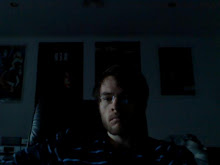1)
from: Oxford Poetry
to: jhp13[at]cam.ac.uk
date: Oct 7, 2007 6:57 PM
subject: OP08
Dr Prynne,
We are committed admirers of yours
here at OP. If there is one thing
which bugs us about the state of English
literary culture, it is that poetry of the quality
you write goes relatively unacclaimed.
We understand you must receive many such
wearying requests, but still we are determined
to ask if you would like to contribute (in any form:
we do not affect to leash our writers to particular
modes) to our 2008 issue. It is most
important to us that the poetry in our journal
avoid the pitfalls many successful poets
wander into it seems guilelessly. If we were able
to include something of yours, it would invigorate
and encourage both us and our student contributors
in the task. With sincere thanks,
Ben Mullen & JCH Potts
editors, OP08
2)
from: J.H. Prynne
to: Oxford Poetry
date: 07 Oct 2007 23:22:51 +0100
subject: Re: OP08
Hmmmmm. I don't think I have anything I could send you right now, thought this might change. Let's see if passing time turns out to make a difference.
J.H. Prynne
3)
from: Oxford Poetry
to: "J.H. Prynne"
date: Nov 9, 2007 5:27 PM
subject: Re: OP08
Thank you for your kind reply; and for your extralong 'Hmm', which we cherish as a measure of how much our offer meant to you, and how much thinking it took to say no.
Your contribution still and always welcome.
BPM, JCHP
Oxford Poetry
Super Songs. Keston Sutherland, Timothy Thornton, Ron Paste — I’m persuaded by people who’re persuaded by Prynne. Owing to their commendations I have his brick of Poems and I paid £14 in money for Sub Songs.
I have his Poems and I have not read it. I read Sub Songs the day it arrived.
The characteristic conservative response to novelty is the scoff. Conservatives’ scoffing — their bluster and bluffness — reacquaints us gently with our certitudes, as if it wasn’t these that were unaccountable. To hazard an answer must be the worst way to defuse live questions like those asked by novel poetry, so the flummoxed conservative must avoid this without giving off any guilty air of evasion. Dr Johnson missed the point but not the stone. Kingsley Amis just hoicked the pale postmodernism of Money at the opposite wall.
Reading Sub Songs it occurred to me that the book was — in a far from unimpeachable way — a challenge: perhaps a test. It seemed to covet the role of foil to my philistine — the philistine it needed me to play, hoicking arm primed for its dismissal. But the book’s provocation wasn’t directed at philistine taste as a target so much as it sought, in the service of the solace and self-regard of those who do endorse the Prynnian style, to conscript the philistine to stand in bogus contrast to its correct method.
Practitioners in the humanities are often smart. Scholars or poets, they are both encouraged in and inclined to a certain intellectual pride. But it’s impossible for them not to sense, on the scene of their success, their culture’s unstudied commitment to their neglect. The society that voted for New Labour in three elections before trading them in for the Clameron chimera denies its avant-garde not only status in reputation but meaning in recognition. For poets who want to respect themselves, then, in a culture that shows its estimate of their value (and to an extent of that of poetry) by an impenetrable obliviousness, it is therapeutic to promote and imitate an art whose signature is its difficulty but whose raison is a retaliatory exclusion; under its sway, the more these poets praise what most won’t contemplate without philistine complaint, the more they can feel themselves companions of an elite. It’s the fact of this process that justifies Archambeau’s intervention in the matter of Prynne and school’s claiming for their work validity as a means of protest. That the poetry is unviable as such — and no more viable as a means of resistance — should be self-evident, and I do mean to be patronising when I say it’s a shame if smart people ever had convictions to the contrary. That the poetry, with its decadent esotericism of diction, is as a medium hostile to those it roots for, but unstinting in its passion in this cause, implies an insanity that precludes political significance. Before politics is even a prospect, though, the extent to which the style’s practitioners can devote themselves to a sense of its radical potential becomes a qualification — like a tenet of a cult, the more admired the more ardently it is held. Who better than nobody to serve and defend in a book that nobody reads? ◦ 2011




it took you over a month to register your riposte?
ReplyDeletePassing time had not turned out to make a difference.
ReplyDelete